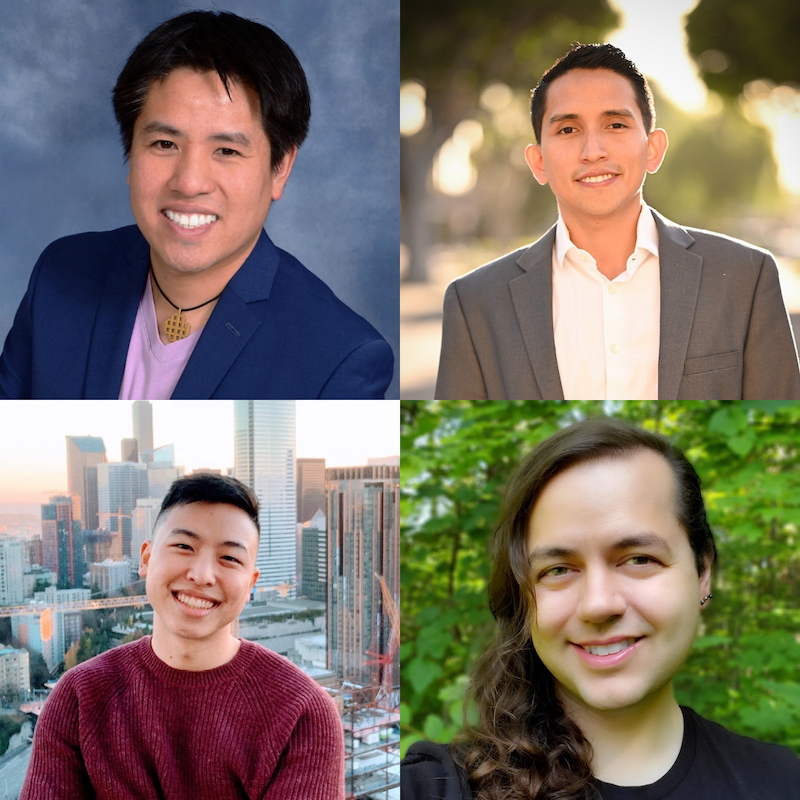LGBTQ+ panelists share unique experiences, offering advice to current students
Author: Jessica Brite
Date: 11.01.21
“How you break down stereotypes is by taking up space—be loud, be comfortable, and speak out for yourself. Take care of yourself, and take care of others like you,” said Arturo Herrera, founder of the entertainment tech startup ShoCast. “By simply doing that and being present and visible—it’s a big contribution to the environment you are in.”
Herrera was one of four panelists for Out in Tech, a conversation hosted by Khoury College of Computer Sciences featuring LGBTQ+ professionals in tech roles. The panelists shared stories and advice based on their unique professional, academic, and personal experiences with current students. The goal of the event was to shed light on what it is like as an LGBTQ+ person working in tech, and how to be comfortable within the workspace.
“[This event] is not only an opportunity to celebrate National Coming Out Day but also LGBT History Month,” said Taylor Sprague, one of the event’s organizers and a co-op coordinator at Khoury College.
 Top row (L to R): John Vu, Arturo Herrera. Bottom row (L to R): Ricky Lee, Grace Collins.
Top row (L to R): John Vu, Arturo Herrera. Bottom row (L to R): Ricky Lee, Grace Collins.
Ricky Lee, a software engineer at Google, expressed his gratitude for the opportunity to participate in Out in Tech, saying, “I have found meaning in participating in these LGBTQ panels. It just means a lot to be the representation you wanted to see when you were younger.”
Having come from different academic and career paths, the panelists presented their unique journeys as members of the queer community working in tech. However, in reflecting and sharing their unique experiences, these panelists gave students tips on how to be their true selves all while navigating challenges of the workplace.
John Huân Vu, engineering program manager at PayPal and another one of the event’s panelists, acknowledged that for queer people, “Being authentic at work can be very very difficult, just being out and being who you are completely.”
For Vu, he feels lucky that the company he currently works at supports him fully and has an inclusive work environment.
“[Your] career is not fixated on your salary—it is also fixated on your whole authentic self,” advised Vu, encouraging students to find companies that will respect them rather than settling for jobs with only good pay.
The other panelists agreed that being true to who you are plays a large role in finding success and comfort within your job.
“I don’t want to act while I’m at work, and it was just so tiring to be the person who they wanted me to be,” said panelist Grace Collins, CEO of Snowbright Studios, reflecting on one of their past jobs. “You can’t give into erasure. When you start giving in to that, you start losing little bits of your identity.”
In Herrera’s situation, he found that when he censored his personality during work meetings, it limited his potential.
“I’ve been able to let go of those notions [that I can’t truly be myself], which has opened me up to more opportunities,” said Herrera. “When you can be pretty authentic, people connect to that.”
The panelists also emphasized that students should take advantage of mentors and the mentorship resources available at the university level.
“I didn’t have mentors back then and it was during a difficult time,” said Vu. “You are lucky to have this because so many people paved the way for you to be safer in this wonderful place.”
As current students prepare to enter the workforce, having a mentor by their side can provide invaluable assistance because mentors use what they have learned throughout their time in the industry to guide their mentees—often acting as role models.
Reflecting on having a mentor and being integrated into the queer community at his company, Lee shared that it has “not only helped me grow in terms of my career, but also as a person.”
Although times are changing and the workplace is becoming more accepting, “discrimination still happens,” said Vu.
On that sentiment, the panelists urged students to use their voices to change the industry—shaping it for themselves and those who will enter the field after them.
“You have to connect with people on an individual level,” said Collins, encouraging students to stay true to themselves and find a space in their workplace where they can feel included.
On an industry level, Vu finds it important to also make changes within the actual work being done in the field. In his work, Vu is pursuing “Justice in Design,” an ideology concerned with identifying implicit bias and racism that may be embedded in code or design. In doing so, the coder/designer signals that “I’m here for equality, and my product is allowed to be used by anyone regardless of their background,” explained Vu.
By sharing all of their success stories, the panelists hoped to leave students feeling confident that they have enough resources and power to feel safe and accepted in the tech industry as members of the queer community.
Subscribe to the Khoury College newsletter
The Khoury Network: Be in the know
Subscribe now to our monthly newsletter for the latest stories and achievements of our students and faculty